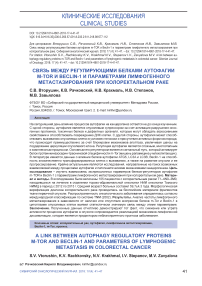A link between autophagy regulatory proteins M-TOR and BECLIN-1 and parameters of lymphogenic metastasis in colorectal cancer
Автор: Vtorushin Sergey V., Rachkovsky Kirill V., Krakhmal Nadezhda V., Stepanov Ivan V., Zavyalova Marina V.
Журнал: Сибирский онкологический журнал @siboncoj
Рубрика: Клинические исследования
Статья в выпуске: 4 т.17, 2018 года.
Бесплатный доступ
Currently the impact of autophagy on carcinogenesis remains understudied. On the one hand, autophagy acts as a tumor suppressor, as it activates degradation of oncoproteins, toxic proteins, and damaged cell organelles, that may be aggressive and lead to DNA damage. On the other hand, autophagy may promote tumor cell survival under hypoxia and in the presence of reactive oxygen species, which occurs primarily due to blocking of apoptosis mechanisms, raising the chances for maintaining tumor clone dynamics. Autophagy regulation is a complicated and multi-stage process. The main regulator here is a signaling pathway that activates serine/threonine protein kinase m-TOR (the mammalian target of rapamycin). Data on the impact of autophagic proteins ATg5, LC3A, LC3b, and beclin-1 on malignant cell survival as well as on tumor growth and progression have been reported in literature. However, studies aimed at seeking possible relationships between autophagy and pathogenetic mechanisms of carcinogenesis are of great interest. the aim of the study is to investigate a relationship between the expression parameters of autophagy regulatory proteins m-TOR and beclin-1 and the features of lymphogenic metastasis in colorectal cancer. materials and methods. The study included 105 patients with T1-4N0-3M0 colorectal cancer treated in the Thoracic and Abdominal Department of Cancer Research Institute of Tomsk Research Medical Center from 2012 to 2015. The average age of patients was 59.7±4.3 years. Morphological verification of the diagnosis was performed on the biopsy samples of primary tumor tissue. Staging of colorectal cancer was determined according to the TNM classification of malignant tumors (2002). results. Analysis of the frequency of lymphogenic metastasis depending on the presence or absence of m-Tor and beclin-1 expression in tumor cell cytoplasm revealed a statistically significant link between these variables. Conclusion. The obtained findings clearly exhibit that deceleration or loss of autophagic activity in the tumor is accompanied by implementation of lymphogenic dissemination, which is a predictor of an unfavorable outcome of the disease.
Colorectal cancer, autophagy, lymphogenous metastasis, Beclin-1, m-Tor, prognosis
Короткий адрес: https://sciup.org/140254197
IDR: 140254197 | DOI: 10.21294/1814-4861-2018-17-4-41-47
Список литературы A link between autophagy regulatory proteins M-TOR and BECLIN-1 and parameters of lymphogenic metastasis in colorectal cancer
- Haggar F.A., Boushey R.P. Colorectal cancer epidemiology: incidence, mortality, survival, and risk factors. Clin Colon Rectal Surg. 2009 Nov; 22(4): 191-7. DOI: 10.1055/s-0029-1242458
- Birgisson H., Wallin U., Holmberg L., Glimelius B. Survival endpoints in colorectal cancer and the effect of second primary other cancer on disease free survival. BMC Cancer. 2011 Oct 11; 11: 438. DOI: 10.1186/1471-2407-11-438
- Meyerhardt J.A., Mayer R.J. Systemic therapy for colorectal cancer. N. Engl. J. Med. 2005; 352(5): 476-487. DOI: 10.1056/NEJMra040958
- Brenner H., Kloor M., Pox C.P. Colorectal cancer. Lancet. 2014 Apr 26; 383(9927): 1490-1502. DOI: 10.1016/S0140-6736(13)61649-9
- Nagelkerke A., Sweep F.C., Geurts-Moespot A., Bussink J., Span P.N. Therapeutic targeting of autophagy in cancer. Part I: molecular pathways controlling autophagy. Semin Cancer Biol. 2015 Apr; 31: 89-98. DOI: 10.1016/j.semcancer.2014.05.004


